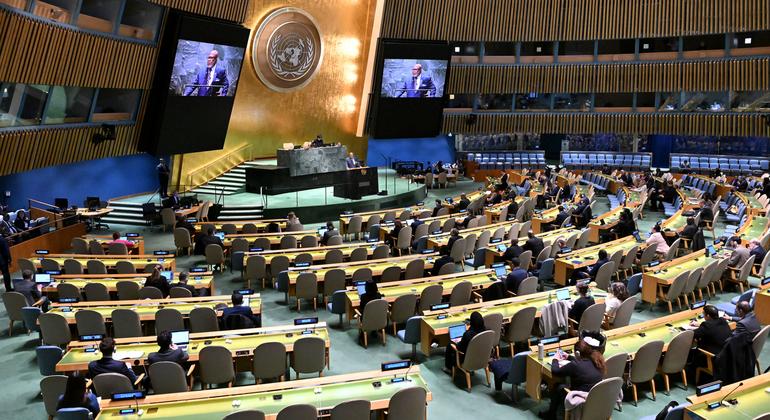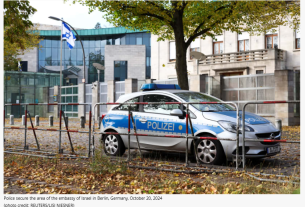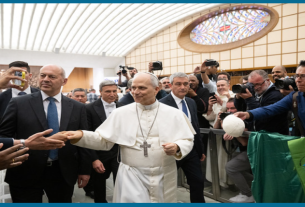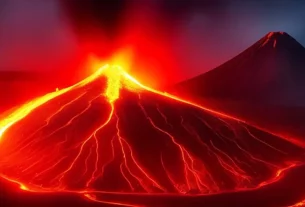HIGHLIGHTS
- The General Assembly debated the use of veto by the United States on 20 February, with the world body’s president saying “the situation in Gaza is catastrophic, unconscionable, shameful”
- The GA president, stressing that a ceasefire is urgently needed, said “it is essential that we rapidly and substantially increase the scale of humanitarian operations and ensure unrestricted access to all civilians in need”
- The US representative said his delegation is working on a new draft resolution
- Member States roundly decried the ongoing humanitarian situation in Gaza
- The 10 non-permanent Security Council members expressed regret at the US veto, saying the 15-member organ must shoulder its responsibilities
- At 3:00PM, the Assembly will meet for an informal session to hear a briefing by Philippe Lazzarini, head of the UN agency for Palestine refugees
- For summaries of UN meetings, visit our colleagues at the UN Meetings Coverage in English and French
Internally displaced Palestinian children shelter in Rafah in southern Gaza.
12:50 PM
Iran: Prevent genocide in Gaza
Ambassador Amir Saeid Iravani of Iran said the US veto will be judged by history. The gravity of the situation in Gaza has garnered the international community’s attention as Israel uses starvation as a weapon of war.

Ambassador Amir Saied Iravani of Iran.
“The Council’s silence has become a license to kill,” he said, condemning the most recent attack on Palestinians seeking aid last Thursday near Gaza City, which killed more than 100 people.
Calling for an immediate ceasefire in the Occupied Palestinian Territory, he said the US obstruction of the Algerian draft resolution runs counter the global call for ending the hostilities.
The principles of international law must protect civilians, he said, adding that a ceasefire must also prevent the starvation of Gaza’s people.
In the same vein, all provisional measures announced in late January by the world court, or ICJ, must be implemented. Considering the Council’s ongoing impasse, he said Member States are required to take steps to prevent genocide in Gaza.
12:24 PM
UK: Suffering in Gaza cannot continue
The suffering in Gaza cannot continue, United Kingdom Ambassador Barbara Woodward said.

Ambassador Barbara Woodward of the United Kingdom.
Last week, the UK and Jordan airdropped tonnes of lifesaving aid to the Tal Al-Hawa Hospital in northern Gaza and announced $5.4 million in additional financing to the UN Population Fund (UNFPA) to support more than 100,000 women and girls in the enclave, she said.
Ms. Woodward called for an urgent investigation into the deaths of people waiting for aid at a convoy last week, which she said must not happen again.
“We cannot separate what happened from the inadequate aid supplies in February,” she added, noting that only half the number of trucks crossed into Gaza compared to January.
She said this latest tragedy serves only to underscore the importance of securing an immediate end in fighting, leading to a permanent and sustainable ceasefire.
“The negotiations led by Egypt, Qatar and the US are the only way to get lifesaving aid in at the scale needed and to free the hostages currently held by Hamas,” she said. “Such a deal would offer the basis from which to achieve a sustainable ceasefire and lasting peace.”
12:05 PM
Elected Council members regret veto
Speaking on behalf of “E-10”, the 10 elected members of the Security Council, Ambassador Vanessa Frazier of Malta said that the draft resolution that was vetoed on 20 February was a “carefully crafted” text addressing the situation on the ground in a comprehensive manner.

Ambassador Vanessa Frazier of Malta addresses the UN General Assembly.
“All E-10 countries voted in favour […] and we deeply regret that the text was vetoed,” she said.
“As elected members, we firmly believe that the Council has the duty and the responsibility to act decisively when faced with such situation,” she said, voicing the group’s concern over the humanitarian situation in Gaza.
Ms. Frazier also noted that UNRWA – the UN agency assisting Palestine refugees – has a “central role” in ensuring an effective humanitarian response.
“Its staff has continued to play that role, even under life-threatening conditions,” she said, highlighting the impact of the conflict on civilians, in particular women and children.
She also recalled recent Security Council resolutions on the crisis, and the 26 January order issued by the International Court of Justice (ICJ).
“We emphasize the fact that the protection of civilians is of paramount importance,” she added, stressing that all parties must comply with their obligations under international al law, including international humanitarian and human rights laws.
In conclusion, she also emphasized the importance of the two-State solution.

More than 80 UNRWA schools have been directly hit or damaged across the Gaza Strip since the beginning of the war.
11:30 AM
EU supports ongoing negotiations
Stavros Lambrinidis, Ambassador and Head of Delegation of the European Union (EU), said that ending the civilian suffering and preventing further loss of lives in Gaza is an “absolute priority”.
“Too many lives have been lost already, too many more are at stake,” he said, expressing strong support for efforts by the US, Qatar and Egypt to work towards agreement on the release of hostages and a temporary ceasefire to ensure a sustained end to hostilities.
“We call on Hamas to immediately release all hostages without any pre-conditions,” he said.
Ambassador Lambrinidis also voiced the regional bloc’s deep concern over the humanitarian catastrophe in Gaza and stressed the need for immediate improvement of aid access over land.
He also highlighted concerns over a possible ground operation in Rafah, where over a million Palestinians are sheltering from the fighting and underscored the need to ensure full respect of international law, including international humanitarian law, by all sides.
“There must be accountability for violations of international law, on all sides,” he said.
11:20 AM
Arab Group condemns Security Council deadlock
Abdullah Ali Fadhel Al-Saadi, Ambassador and Permanent Representative of Yemen to the UN, speaking on behalf of the Arab Group, said that the “repeated failure” of the Security Council to undertake its duties and obligations in safeguarding international peace and security and stopping the bloodshed in the Gaza Strip “is a stain on the conscience of the Council and of humanity as a whole”.

Ambassador Abdullah Ali Fadhel Al-Saadi of Yemen.
“The draft resolution had reflected a balanced position and gave priority to humanitarian dimensions to save hundreds of thousands of Palestinians, yet it was disappointing to see a member of the Security Council using the veto right,” he said.
“This has allowed the Israeli military machine to continue its massacres against Palestinians civilians,” he added, enumerating the impact of the war on civilians, especially women and children, and the dire humanitarian situation.
He said that the continuation of the “criminal practices” required the General Assembly and UN Member States to “seriously consider” practical steps to “stop this madness and stop the Palestinian bloodshed”.
“The Arab Group demands the international community and the Security Council to guarantee the protection of civilians ensure access and delivery of humanitarian aid at an expanded level without any obstruction, and implementing Security Council resolutions 2712 and 2720,” he added.

Aid is distributed to displaced Palestinian families sheltering at an UNRWA school-turned-shelter in Deir Al-Balah in central Gaza in December. (file)
11:13 AM
Qatar: Vetoed draft flouts UN Charter
Ambassador Alya Ahmed Saif Al-Thani of Qatar spoke on behalf of the Gulf Cooperation Council (GCC), noting that the failed draft resolution sought to respond to “the worst humanitarian disaster in modern history caused by the ongoing aggression launched by Israeli occupation forces”.

Ambassador Alya Ahmed Saif Al-Thani of Qatar.
She said the number of victims continues to grow and has exceeded 30,000, with tens of thousands more wounded and missing under the rubble, according to UN reports. Women and children comprise the majority of victims while two million people are internally displaced.
“The GCC member States reiterate their deep regret regarding the failure of the Security Council to adopt a draft resolution calling for an immediate ceasefire, despite the fact that this draft resolution garnered the support of 13 members of the Security Council,” she said.
“This was backing away from the historic commitment in the preamble of the UN Charter that called for saving succeeding generations from the scourge of war.”
10:51 AM
Israel: Ceasefire must have pre-conditions
Gilad Menashe Erdan, Ambassador and Permanent Representative of Israel to the UN, said that it has been 150 days since Hamas committed “the most brutal and barbaric massacre since the Holocaust”.

Ambassador Gilad Erdan of Israel.
“Once again, this body [General Assembly] has convened not to condemn Hamas, no. Not to condemn their atrocities, but to focus again only on the situation in Gaza, as if 7 October never happened, as if there are not 134 innocent hostages held and tortured in Gaza right now,” he said.
He noted that over the five months, “not one” discussion at the Assembly on the wellbeing of hostages or on the sexual violence perpetrated by the group.
Mr. Erdan called on the Secretary-General and the Security Council to convene immediately to “finally condemn Hamas’ heinous crimes”.
“Hamas must face unrelenting pressure to end their sexual violence and release all of the hostages immediately,” he stressed.
10:22 AM
Palestine: Israeli atrocities are ‘unchecked, unhinged’
Riyad Mansour, Permanent Observer of the State of Palestine, stated that there is no greater to international peace and security than the commission of atrocities, adding that for five months now, “Israel has been committing atrocities against the Palestinian people, unchecked and unhinged.”

Riyad Mansour, Permanent Observer of the State of Palestine to the United Nations.
“The Security Council has been prevented repeatedly from calling for an immediate ceasefire to put an end to these atrocities,” he said, emphasizing the dire impact of the conflict on Palestinian civilians, especially children, and demanding that the “war of atrocities” must stop.
“Israel must be told to ceasefire, to cease fire now,” he said.
Mr. Mansour stated that there were “reasons why ethnic cleansing” was possible in Palestine.
“It is the certainty of the perpetrators that they will never be held accountable,” he added, calling for an end to “Israeli impunity”.
“The era of Israeli impunity must come to an end, and we should enter a new era of accountability and sanctions,” he stressed.

An aerial view of the heavily damaged and collapsed buildings in Gaza City.
10:19 AM
US: Working on new draft resolution
The draft resolution at hand would not have achieved the goal of sustainable peace nor resulted in a ceasefire, said Robert A. Wood, United States Deputy Permanent Representative to the UN.

Deputy Permanent Representative Robert A. Wood of the United States.
Indeed, his delegation had cautioned the Security Council that doing so could disrupt the intensive efforts underway to release the hostages and achieve a temporary ceasefire. Instead, the US has circulated a draft that would achieve a temporary ceasefire which would allow hostages to go home to their families and would help get aid into the hands of Palestinian civilians, who so desperately need it.
“The question before us is what is the most effective way to achieve these goals,” he said. “In our judgment, it is the work of the United States, both here in New York and on the ground.”
Washington will continue working to get more aid in as well as engaging tirelessly in direct diplomacy and negotiations on the ground, he said.
“We remain committed to engage constructively on our resolution in the days to come,” he said.
10:15 AM
General Assembly President calls for ceasefire
General Assembly President Francis said that from the UN’s inception in 1945, the world body and the Security Council have an overarching duty to save generations from the scourge of war, and called for the international community to act now to end Gaza crisis.

General Assembly President Dennis Francis.
“The situation in Gaza is catastrophic, unconscionable, shameful,” he said. “I am shocked and horrified at the reported killing and injury of hundreds of people during disbursement of aid supplies, west of Gaza City last week.”
This comes with a rising death toll, babies dying of starvation, and 85 percent of Gaza’s population – or 1.9 million people – are internally displaced.
Extremely concerned about pending Israeli ground operations in Rafah, where nearly 1.5 million people now reside, he urgently call for maximum restraint to prevail in order to save innocent civilian lives.
Israeli restrictions on humanitarian access have drastically reduced the flow of lifesaving aid to a mere trickle, with UNRWA reports a significant 50 per cent reduction in the number of trucks entering Gaza daily from January to February, he said.
“It is therefore essential that we rapidly and substantially increase the scale of humanitarian operations and ensure unrestricted access to all civilians in need,” he said.
First and foremost, an immediate humanitarian ceasefire must be implemented and all parties must comply with their obligations under international human rights law and international humanitarian law, especially as it relates to the protection of civilians and civilian facilities.
In addition, all hostages must be immediately and unconditionally released, and full and unimpeded access to humanitarian assistance by those in need must be ensured.
Debate on veto use
The Assembly will debate the latest Council rejection of a draft resolution on a Gaza ceasefire under a mechanism that examines the use of veto in the Security Council, which can trigger an emergency special session on the matter. Read our explainer what happens when the Security Council fails to reach agreement here and on emergency special sessions here.
Security Council deadlock
For weeks, the Security Council has been deadlocked over adopting a resolution to end the war, which has killed more than 30,000 Palestinians and left hundreds of thousands facing severe hunger. The US has vetoed several drafts since the start of the war. The Council’s five permanent members (China, France, Russia, United Kingdom, United States) have the power to cast a veto.
Over the weekend, the Security Council issued a statement calling for immediate action to swiftly ramp up aid delivery to the enclave, especially to the devastated northern region.
That came after last Thursday’s deadly attack on hungry Palestinians waiting for aid deliveries organized by Israel, according to media reports.
In the 15-member organ’s statement, the Council expressed deep concern over reports that “more than 100 individuals lost their lives, with several hundred others sustaining injuries, including gunshot wounds…in an incident involving Israeli forces at a large gathering surrounding a humanitarian assistance convoy southwest of Gaza City.”
According to media reports, on a Saturday, a similar Israeli attack on Gazans waiting for aid left many dead and many more injured.
UNRWA to brief General Assembly
Later in the day, the General Assembly will hear a briefing by Philippe Lazzarini, the head of the UN agency for Palestine refugees, UNRWA, who is expected to brief following his letter to Assembly President Dennis Francis last week.
In the letter, the UNRWA chief said the agency would soon be unable to fulfil its mandate because of funding cuts stemming from Israel’s allegations that agency workers were complicit in Hamas’s October attacks.



